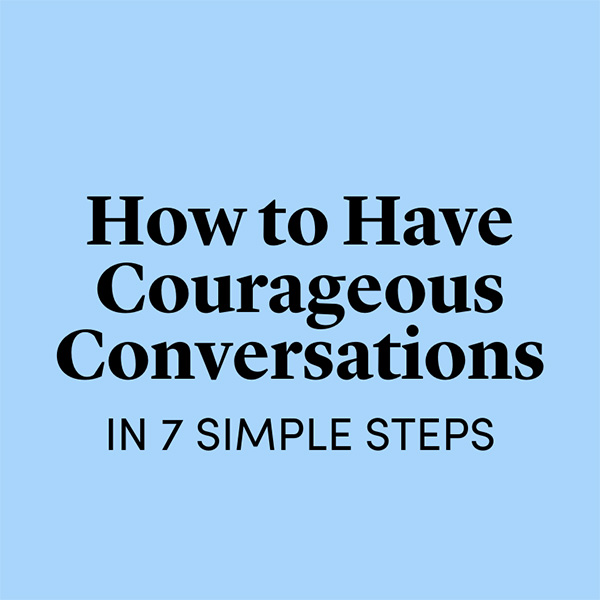All the “relationship secrets” you got from your wizened elders can be distilled into one strong statement: Open, effective communication is the key to happy, long-lasting bonds – be it your husband of 30 years, best friend since grade school, or your new boss. Being a good listener, being honest with yourself and your co-communicator, even expressing a willingness to disagree sometimes – these are all examples of good communication skills that you can actively enhance to deepen your relationships.
Touchy Topics
But what happens in happy relationships when a problem arises? What if you need to tell someone you love about something uncomfortable or troubling? What can you do to deal effectively with an issue that has been bothering you? Handel Group Life Coach Laurie Gerber explains why we sometimes choose to stay silent about things that are hurting us. “So often we avoid difficult topics purely out of fear – fear that the other person will not like what we have to say, that we’ll face a backlash, that it will cause us or the other person harm, or that we’ll be rejected in some way,” she says. “We are so afraid of rejection, we pave its way by never even asking for what we want.”
It Takes Courage!
The truth is, you can’t predict the outcome of any conversation, let alone the ones you have been avoiding. Choosing to voice your concern or share an issue with someone takes confidence, honesty, and even vulnerability. But the pay-off can be huge, especially if it’s something that has been bothering you for a while or if you really want to foster change. Honest, courageous conversations bear the gift of clarity and resolution, for you and everyone around you. Gerber provides an easy-to-follow checklist, based on the Handel Method, that you can use the next time you need to speak your mind in a meaningful way.
1) Set aside time and ask permission to have the conversation with the person.
Make sure you’re not ambushing anyone! It’s important to check their physical and emotional “readiness” before you launch into touchy subject matter. “When would be a good time to talk about something personal?” or “Are you feeling up to a serious conversation right now?” Someone who is tired, sick, busy, or stressed is not going to respond well to what you have to say. Checking in with them shows that you care about how they feel regardless of the issue at hand. Always get permission first.
2) State your intentions, feelings and/or fears.
Let them know why you want to have the conversation – for a better friendship, greater understanding, ease of mind – as well as what’s been stopping you. “I was afraid you would be angry,” or “My feelings were hurt and I didn’t know how to tell you.” When you share openly, you create a safe place for the other person to share openly too.
3) Frame the conversation gracefully.
Meanness, resentment, and instigation do not serve you in a courageous conversation. “Remember,” Gerber says, “a healthy conversation is not an argument or a fight. There shouldn’t be any finger-pointing or harsh words being aimed at the other person. If your goal is a peaceful mediation or a compassionate resolution, the process needs to reflect that. Don’t have the conversation until you can honestly say, “I am sure there is something I have to learn here,” and/or you are already ready to own your part.
4) State your issue.
Be clear, be calm, be concise. If you need to write down the issue or rehearse it ahead of time, then DO! Don’t go overboard with examples of wrongdoing or a labyrinth of “he-said-she-said.” Be confident in your delivery and be prepared to listen for a response. The formula “When you did/said X, what I thought was Y” works infinitely better than accusations.
5) Ask them questions such as: “How is this for you? What’s your perspective? Do you know what I’m talking about?”
Look for validation, any common ground you can share, or ways in which the other person can relate. “When you become someone who tells the truth about how you feel and what you want,” Gerber says, “people relate to you differently. If you do it with grace, people will even want to give it to you.”
6) Listen fully to their response. Then say back to them what you heard so they know you really heard them.
This important step will force you to become a better listener, instead of someone who is just waiting for a chance to fire back. “So, I heard you say that you are X, Y, and Z – did I understand you correctly? Is that what you mean?” As important as it is that you get your point across, it is equally important that you listen to and fully understand the response. This will create real intimacy and a natural desire for resolution.
7) Note any discrepancies, agree on, and review any possible resolutions. Perhaps make an agreement about how to handle future negative situations.
Agree on a way to move forward, even if that way is to “respectfully disagree.” If you learned what triggers or upsets the other, make an agreement not to do those things, or to speak up as soon as it happens. If you know you need to connect more, make an agreement to do that on some regular basis.
- Talk to a human!
- Find out what HG coaching is all about
- Learn about our different coaching programs and pricing options
- Design a coaching program based on your current challenges and goals
Now assess: Do you feel relieved or resolved? Did you get your point across? Did you do it effectively, without harsh judgements or criticism?
Gerber points out, “Each difficult conversation you design and have is a risk and each will reward you, even if it doesn’t go exactly as you predict, though sometimes you won’t know right away what the rewards are.” Be patient. The more risks you take and rewards and results you collect, the more confident and courageous you will become about telling the truth to yourself and others. This will be very freeing. “We hide things thinking we are protecting ourselves and others, when we are accomplishing neither. When you reveal your true self, your thoughts, fears, concerns, judgments, past regrets, you find that you are more like those around you, than un-like, and that makes for a lot more liking on everyone’s part.”
Try It Yourself!
Humans are social creatures! So much of our life’s experience is determined by how well we communicate with each other. Learning and practicing the Art of Courageous Conversations doesn’t just resolve conflicts and stop arguments in their tracks, it is the key to making a meaningful impression and deepening your relationships with others.
Make a goal this week to have one courageous conversation that you have secretly been avoiding due to a touchy subject, a sensitive friend or colleague, or your own feelings. Use these steps to track your progress and see what a difference they make!

